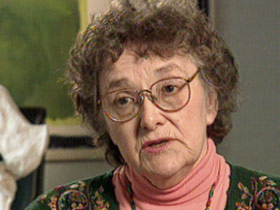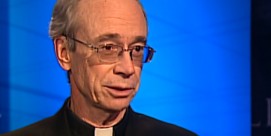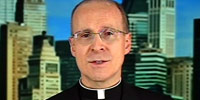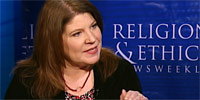In This Episode << SLIDE LEFT TO SEE ADDITIONAL SEGMENTS
Rosemary Radford Ruether Extended Interview
Read more of Judy Valente’s interview with Rosemary Radford Ruether:
Q: What are the implications at the present time of these scandals in the Church?

A: People are quite dismayed and quite angry. It’s a common topic for sermons. We had a sermon at our church last Sunday. Basically, the priest said that we need to stop scapegoating people. In other words, let’s not go blaming homosexuals. There is no evidence that this is caused by homosexuality. We need to deal more appropriately with the real problems, and not by trying to find somebody to blame.
Q: What impact do you think it’s having on people right now?
A: My sense is that people are angry, but they’re primarily angry at the way in which the hierarchy has dealt with this, rather than necessarily angry with priests as a whole.
Q: What aspect do you think they’re angry at?
A: They’re angry at the cover-up and the fact that people who were known to have these problems were shifted around, and the people in the next parish or the next diocese were not told. The anger is really with the hierarchy, primarily.
Q: Is the problem worse than it appears? Do you believe there’s more bad news to come?
A: I think there’s more bad news [about] pedophilia, but there’s a much wider issue that is not being dealt with, and that is the abuse of girls, of young women, and a whole underworld of priestly sexuality that is just being denied.
Q: Why do you think that’s not being dealt with?
A: Maybe because men are interested in men’s issues. I don’t really know, but it’s very clear that most of us know very well that there’s also abuse of young women. In many parts of the world, and I don’t know if this is true in the United States, there is a whole issue of how nuns are sexually harassed and even raped by priests.
Q: Can you offer any explanation why this would have been denied or relegated to the sidelines?
A: The issue of the rape or sexual forcing of nuns came out as a big story a few years ago in Africa, and that’s not being mentioned at all in this whole issue.
Q: Are you convinced the Vatican realizes the depth of the problem?
A: No, they don’t realize it at all. I think they see it primarily [as] managing an institutional image, which tends to be the way institutions respond generally, and this is no surprise. I think they see some pressure for change of celibacy, so they’re really not dealing with the issue that concerns most people in the laity.
Q: Is it too early to assess the long-term impact of the scandals?
A: I don’t think we know that, because it will depend a lot on how the hierarchy adapts — if they really widen the consultation to real experts and the laity. If they restore trust in that kind of way, you could have one effect, but if they continue to stonewall and try to blame homosexuals and the victims themselves, to suggest that somehow these people that were victimized were negligent, as Cardinal Law apparently said, then people will get angrier.
Q: What will it take to restore the trust?
A: Real consultation with experts and a broad sense of allowing the laity themselves to enter into consultation, rather than trying to close ranks [and] defend the hierarchical institution.
Q: Do you think change will begin at the parish level? Will this result in, perhaps, a greater role for the laity?
A: I’m not sure the parish is the level. I think actually what you are going to see are organizing efforts by networks of lay organizations. National organizations like the one called Action, or perhaps local laity, like the businessmen in Chicago. I think you’re going to have organizational movements of that kind, that are neither the hierarchy nor simply at the parish level.
Q: What do you think will change?
A: There are two options: dealing with the real failures, which is the hierarchical cover-up, or [its] continuation. Which of these is chosen will make a lot of difference — [you could] continue to have people increasingly angry and then organizing real boycotting of funds and so on, or you could have developments that will restore trust.
Q: If the appearance of stonewalling continues, what will happen?
A: Clearly, some boycotts of contributions are one possibility, but perhaps there will be more people convinced that we simply need to change the whole profile of the priesthood.
Q: Do you think there’ll be breakaway groups from the Church?
A: Well, there are always breakaway groups from the Church, but that doesn’t actually change the institutional structure that much.
Q: Are there signs that Catholics are withholding contributions in serious proportions, or is this just a lot of blowing smoke?
A: There clearly is a group suggesting that, and I have no idea how widespread it is. A lot of people, and I would include myself in this, are not really interested in denying funds to their own parish if they’re pleased with their parish. They want to support their own programs in their own parish. What they’d like to do is deny funds to the bishop and the Vatican. In other words, it’s really the hierarchy that they see as the problem.
Q: Do you think it’s a mistake to withhold contributions?
A: Withholding contributions definitely will get the hierarchy’s attention, if nothing else. But you have to be sure that you’re simply not scapegoating the local community, [which is] actually paying the price for a lot of this. In other words, the contributions of the laity are being used to pay people off, and that’s distorting the funds available for [the people’s] own programs. People want to discriminate; they want to make statements that will call the hierarchy to attention without necessarily scapegoating their own local communities.
Q: The Vatican, at one point, suggested this was an American problem, yet, as you mentioned, there are problems in other countries. Do you think bishops in other countries are looking the other way?
A: I think it’s a global problem, but there are many places where the issue is really the abuse of women and girls. It’s a major problem in Africa, because a certain number of priests want to have sex with nuns because they’re celibate and therefore assumed to be clean, to avoid prostitutes who might have AIDS. I know from being in India that there is also a problem of sexual harassment of nuns. The Vatican didn’t want to deal with this at all. But it’s a much broader issue. I think pedophilia is actually widespread globally as well, but it’s simply that churches [abroad] have not dealt with it. What makes it an American issue is that we actually have organized to go to secular law, and that has forced the issue open. In many countries where the Church is more of a state church, that is difficult to do.
Q: Do you think the Vatican views the American situation with some suspicion — that this is really a back-door effort by liberals to get change on the agenda? And will that prevent meaningful changes from taking place?
A: I think that that was the initial take on it. I don’t think that’s the take anymore. The pope, in any case, has been apprised that this is not a sufficient response. I think, initially, he was suspicious that this was a way of challenging celibacy, and he’s not at all open to that. I think he’s become convinced that there is a real problem of pedophilia that he had to deal with.
Q: Can the reforms being demanded by liberal Catholics lead to a discussion of changes that for now aren’t on the table? For example, married priesthood and ordination of women?
A: I’m not sure that a married priesthood and the ordination of women ought to simply flow from pedophilia. I think that’s a much broader issue. There is, you might say, a connection in the sense that people come to feel that the present socialization of priests into a celibate culture creates an immature group of people and, increasingly, a pool of people not sufficient in numbers, and so on. That creates more demand to broaden the people who are able to be ordained. That’s the connection. Those issues need to be discussed in a much wider context and not simply as a response to pedophilia.
Q: Women’s ordination has been brought up in relation to the scandals. Isn’t this a doctrinal matter on which the Church can’t change its teaching?
A: The Church can change its teaching, but essentially, you have a pope who doesn’t want to listen to the arguments, scripturally and theologically, that have been quite well developed by theologians and scriptural scholars. A few years ago, when the Vatican put out a statement that this could not be changed, biblical theologians said that this is not responsible biblical interpretation. The arguments are out there very clearly, and the question is simply to have a pope who is willing to listen to them rather than a pope who’s not willing to recognize that these arguments really don’t hold water. Obviously, they don’t hold water even historically — the ordination of married men was the predominant Church practice for the first thousand years.
Q: It’s reported that priests have wives in Latin America. There are, of course, married priests in the Eastern rite of the Catholic Church. How can the Church defend this double standard?
A: The demand for celibacy in the West was, I think, a mistake to begin with. It was an effort to put what was basically a monastic tradition onto the regular priesthood, and to force the regular priesthood not to marry. It never worked. Through the Middle Ages, the ordinary parish priests kept right on having wives and children, but they were juridically declared to be concubines and bastards, and it never changed. The Reformation, of course, just revolted against these laws, but they didn’t really change from a celibate to a married priesthood, because that had never really changed. This effort to make the priesthood celibate has never worked. Even today in the United States, there’s a whole underground world of priests who actually have wives and children, but they live in double worlds.
Q: Do you think that the celibate priesthood is scripturally sound?
A: No, because celibacy belongs to monasticism. It does not belong to the priesthood. It’s not a part of the New Testament. The New Testament clearly envisions a married priesthood.
Q: What do the American bishops have to do when they meet in Dallas to convince the laity that there will be fundamental change?
A: I think that they have to say a word of self-critique. They have to stop trying to scapegoat homosexuals, and they have to clearly say, “We have not handled this appropriately.”
Q: What is the likely effect on the priesthood? Do you think that fewer men will want to be ordained now?
A: It could be that fewer men will want to be ordained. The problem is having less and less healthy candidates. The whole celibate culture, I think, has created a situation where healthier men don’t want to be a part of that. That’s part of the atmosphere that has created this problem. It’s not that homosexuals as a group have a tendency to pedophilia, but rather, if you create a certain culture that’s designed to prevent people from really dealing with their own sexuality, it creates a kind of immature personality. There’s a connection that’s been analyzed a lot between a certain kind of celibate, clerical culture and the tendency to prevent men from mature self-development. I think there’s a connection there, but not that somehow celibacy itself is a cause of pedophilia.
Q: Are you for celibacy in any form?
A: I think it’s appropriate for monastic life; it’s not appropriate for the priesthood.
Q: Finally, how might this affect the legacy of the pope?
A: I don’t know that it would affect the legacy of the pope. It might affect the legacy of Cardinal Law in Boston.







